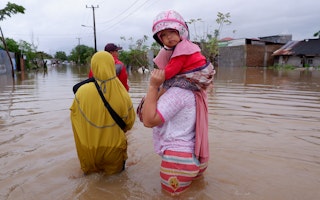Climate change impacts international migration and domestic mobility, but projections of the future of migration due to climate change remain difficult to make. The latest research overview by Mathias Czaika and Rainer Münz on Climate Change, Displacement, Mobility, and Migration provides us with insight into the current state of knowledge about this critical issue.
While natural disasters have displaced 342 million people between 2008 and 2021, they have rarely led to long-term emigration or displacement across international borders. The implications of gradual environmental degradation induced by climate change on internal mobility and international migration are more complex to assess and predict than the direct effects of sudden-onset natural disasters.
Over the last 40 years, more than 2 billion people have moved from rural to urban areas. While it is not possible to isolate climate change as a factor, environmental degradation has, in general, intensified this movement. Model calculations assume that, until 2050, between 78 and 175 million people will be mobile due to climate change, but only a minority of these will become internationally mobile.
The future of climate-induced internal mobility and international migration is uncertain. We must assume the human ability to cope and adapt, opening possibilities for people to stay and survive in affected regions. Central to these possibilities will be the political will and collective resolve to invest in the prevention and adaptation measures that Climate Change, Displacement, Mobility, and Migration informs us will become increasingly necessary.
Speakers
-
Goran Buldioski
Speaker
Goran Buldioski is acting executive director of Open Society–Europe and Central Asia.
-
Felicitas Hillmann
Speaker
Felicitas Hillmann is head of the Paradigm Shift Networking Unit at TU (Technische Universität) Berlin.
-
Rainer Münz
Speaker
Rainer Münz, author of Climate Change, Displacement, Mobility, and Migration, is currently visiting professor at Central European University (Department of Public Policy) and at the Diplomatic Academy in Vienna.
Read more
Climate Finance
Unlocking Sorely Needed Investment in Green Energy Projects Across the Global South

Allied Climate Partners, supported by Open Society and other funders, aims to mix public and private funds to support clean energy production and transport in Asia, Africa, Latin America, and the Caribbean.
Art for Healing In Depth
Land, Memory, and the Power of Art

How can communities use art to imagine a better tomorrow that protects and celebrates nature—and the people that live within it? The 2023 Soros Arts Fellows will pursue projects that reckon with the role of socially engaged art in a time of crisis.
People-Centered Progress
The Challenge at COP28: Safeguarding Climate Justice

Evidence of the climate crisis abounds, but progress in addressing it has been far too slow. At COP28, wealthy nations need to fulfill their commitments to aid developing nations on the front lines of climate change.